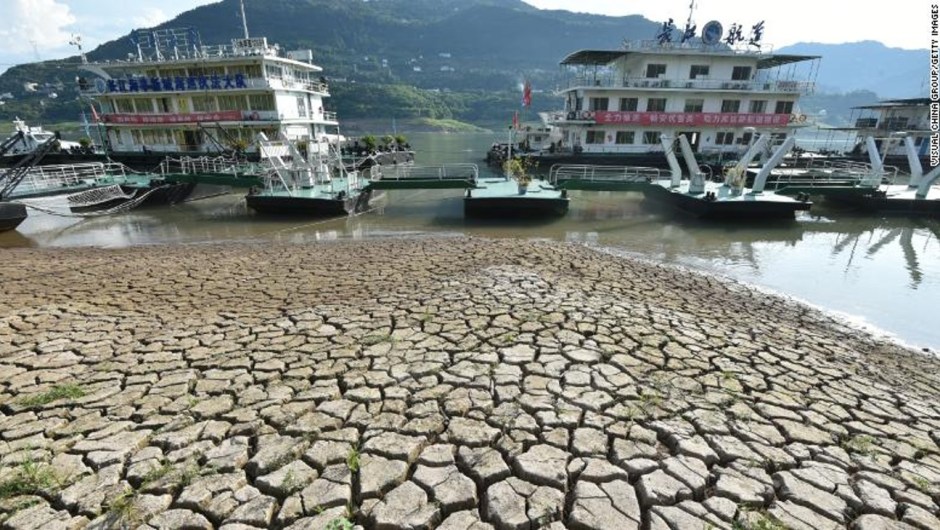Hong Kong (CNN) --
Chinese planes are firing rods into the sky to bring more rain to its crucial Yangtze River, which has dried up in parts, as swaths of the nation slip into drought and grapple with its worst heat wave ever. registered.
Several Yangtze regions launched weather modification programs, but with too little cloud cover, operations in some drought-stricken parts of the river basin have been put on hold.
The Ministry of Water Resources said in a notice Wednesday that the drought in the entire Yangtze River Basin was "adversely affecting the drinking water safety of rural people and livestock, and the growth of crops."
On Wednesday, central China's Hubei province was the latest to announce it would seed clouds, using silver iodide rods to induce rain.
No river in Europe is safe from the current drought: the case of river cruises and tourism
Silver iodide rods—usually the size of a cigarette—are fired into existing clouds to help form ice crystals.
The crystals then help the cloud produce more rain, making its moisture content heavier and more likely to be released.
advertising
Cloud seeding has been practiced since the 1940s and China has the largest program in the world.
He used seeding ahead of the 2008 Beijing Olympics to ensure dry weather for the event, and the technique can also be used to induce snowfall or soften hail.
At least 4.2 million people in Hubei have been affected by severe drought since June, the Hubei Provincial Emergency Management Department said Tuesday.
More than 150,000 people have difficulty accessing drinking water and almost 400,000 hectares of crops have been damaged by high temperatures and drought.
The Yangtze is just one of many rivers and lakes in the Northern Hemisphere that are drying up and shrinking amid relentless heat and low rainfall, like Lake Mead in the United States and the Rhine River in Germany.
These extreme weather conditions have been fueled by the human-induced climate crisis, fueled by the burning of fossil fuels.
Communities often depend on these bodies of water for their economic activity and governments are having to step in with adaptation measures and relief funds, which cost huge amounts of money.
China is deploying those funds and developing new sources of supply to deal with impacts on crops and livestock.
Some of the cattle have been temporarily relocated to other regions, the Finance Ministry said earlier this week, adding that it would issue 300 million yuan ($44.30 million) in disaster aid.
To boost downstream supply, the Three Gorges Dam, China's largest hydropower project, will also increase water discharge by 500 million cubic meters over the next 10 days, the Ministry of Water Resources said on Tuesday.
The heat also forced authorities in the southwestern province of Sichuan — home to some 84 million people and a key manufacturing hub — to order all factories closed for six days this week to ease power shortages.
The "longest" and "strongest" heat wave in China's history
China issued its highest red alert for heat on Wednesday for at least 138 cities and counties across the country, with another 373 placed under the second orange alert, according to the Meteorological Administration.
As of Monday, China's heat wave had lasted 64 days, making it the longest in more than six decades, since full records began in 1961, the National Climate Center said in a statement.
He also said it was the "strongest" on record and warned it could worsen in coming days.
"The heat wave this time is prolonged, wide-ranging and strong at its extreme," the statement said.
"Taking into account all the indications, the heat wave in China will continue and its intensity will increase."
The heat wave has also seen the largest number of counties and cities to exceed 104 degrees Fahrenheit (40 degrees Celsius) since records began, according to the statement.
The number of weather stations recording temperatures of 40C or higher has reached 262, also the highest.
Eight have reached 44C.
High temperatures are forecast to continue in the Sichuan Basin and much of central China through August 26.
A "special case" of high pressure from the western Pacific subtropical high, which stretches across much of Asia, is likely the cause of the extreme heat, said Cai Wenju, a climate researcher at CSIRO, the country's national scientific research institute. Australia.
CNN's Larry Register, Angela Dewan and Laura He contributed to this report.
ChinaDrought

